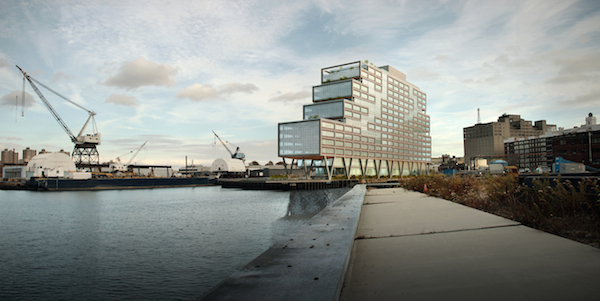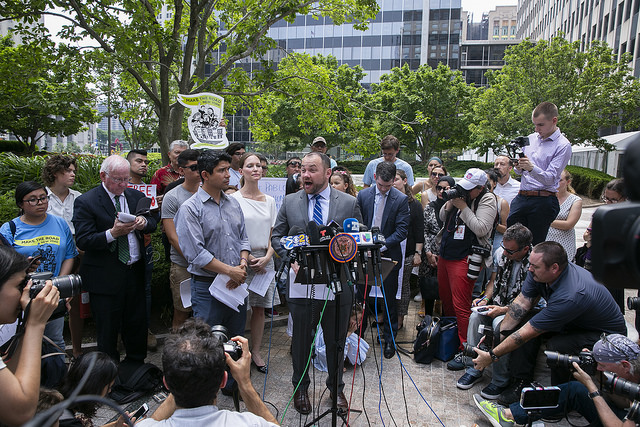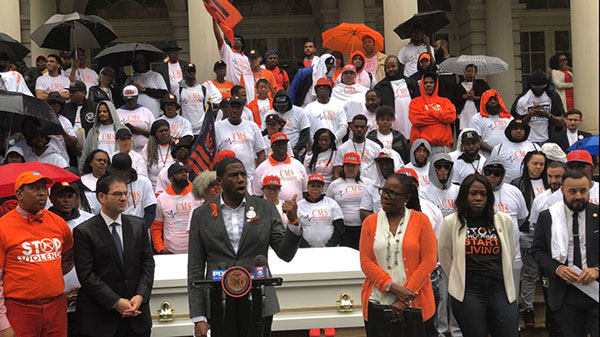In Crowded Office Market, Amenities are a Must

Dock 72 rendering
As New York’s economy continues to thrive, the city’s construction and real estate industries are enjoying a sustained building boom that is creating more than 2.5 million square feet of new office space each year. Even with this unprecedented growth, there is still an insatiable demand for new commercial space from companies new and old. To stand out in such a market, developers must create innovative offices filled with cutting-edge amenities – and this trend is reshaping commercial real estate in the five boroughs and beyond.
Amenities like roof decks and fitness centers have long been staples of luxury residential buildings. But more recently, developers and property owners have begun incorporating these perks into commercial office space as a way to attract new and younger tenants. This movement has only intensified in recent months as more and more young professionals and creative companies are drawn to New York City.
Ironically, the apex of this new trend in commercial real estate can be found at one of the City’s oldest facilities: the Brooklyn Navy Yard. Thanks to almost $1 billion of public and private investment, the Navy Yard is in the midst of its largest expansion since the Second World War. The Navy Yard is poised to add 10,000 jobs across two million square feet of new space, in part because that space is optimized to attract the types of companies and talent driven by innovation.
A centerpiece of the Navy Yard’s expansion is the new high performance office building, Dock 72, on which our firms, Boston Properties and Rudin Development, and our anchor tenant, WeWork, have partnered to provide commercial tenants with world-class amenities, sustainable design, and state-of-the-art technology.
Our vision for Dock 72 has been to create a next generation waterfront workplace, where tenants and their employees can collaborate and connect with their coworkers and neighbors. That is why our team is collaborating with WeWork to create a truly unforgettable workplace environment, generated with the well-being of tenants in mind.
When completed later this year, Dock 72 will offer tenants multiple organic food, beverage, and coffee options; an outdoor basketball court and a full-service fitness complex; and a rooftop conference center, event space, an open lawn, and terraces with breathtaking views of the surrounding Navy Yard, the East River, and Manhattan. These amenities were curated by WeWork, based on the best practices they’ve developed while attracting innovative companies in cities around the world. They’re just a few of the reasons why tenants of Dock 72 will enjoy one of the best work experiences in New York City.
Landlords and developers know that it isn’t enough to just offer modern office space – the recent boom in commercial construction means that potential tenants have a wide-variety of options to choose from. That’s why companies like ours will continue pushing the boundaries and coming up with new, state-of-the-art amenities.
This is good for New York City. Businesses that locate in innovative new spaces like Dock 72 will have happier and healthier employees, which will in-turn make them more productive. This creates a virtuous cycle that will keep our city a vibrant and prosperous economic hub for decades to come.
***
Michael Rudin is a Senior Vice President at Rudin Management Company and Andrew Levin is Senior Vice President of Leasing-New York of Boston Properties.
***
Have an op-ed idea or submission for Gotham Gazette? Email This email address is being protected from spambots. You need JavaScript enabled to view it.
City Leaders Say They Stand with Muslims & Immigrants, But Do They Mean it?

(photo: William Alatriste/City Council)
New York City’s leaders have recently been protesting with Muslim and immigrant New Yorkers, but these same leaders are often missing once the cameras are gone. After last week’s stunning Supreme Court setback, the time finally has come for these same leaders to ditch New York City’s anti-Muslim and anti-immigrant police policies.
We clearly say we’re a sanctuary city, but the facts on the ground are unclear. No, city workers can’t ask about immigration status, but NYPD officers continue to use dragnet surveillance on immigrant communities. Most importantly, they continue to share that data with Immigration and Customs Enforcement (ICE), which the Trump administration is using to intensify its deportation efforts.
Every day, license plate readers all across New York City monitor cars in real-time. These cameras create a massive database of our movements across the city. But instead of using this database just to do police work, the NYPD shares the data with private, for-profit firms like Vigilant Solutions, a company that struck a deal to share New York data with ICE earlier this year.
But the license plate readers aren’t even the worst part. At least the City told us about them. All-too-often, we only find out about spy tools after they’ve been used for years. Tools like stingrays, fake cell towers that can suck-up all the phone data for miles around. To target one suspect, stingrays often need to track thousands of phones. Worst of all, the NYPD has even used these devices without a warrant. Wondering if your texts or calls were copied before? There’s no way to tell.
The City Council knows about the problem now – we told them about it – but for years this spying went on in secret. How? The NYPD has a slush fund: millions in federal and private dollars that can be spent without any oversight by the City Council. The mayor could end this tomorrow; Mr. de Blasio could require the NYPD to disclose how its spy data is shared with ICE with the stroke of a pen. But I’m not holding my breath.
Instead, we need the City Council to act. For years, CAIR-NY, NYCLU, and other advocates have pushed the POST Act, a commonsense bill that would require the NYPD to tell our lawmakers what military-grade spy gear they’re buying with private and federal dollars and how they’re keeping that information safe. The NYPD could continue surveillance, but the cowboy-era of buying whatever it wanted, whenever it wanted would be over. More importantly, the NYPD would finally enact policies to make sure our city’s resources won’t help ICE deport our neighbors.
But, the bill has stalled.
Our city’s leaders have long promised to make New York a sanctuary for all—a symbol of inclusion at a moment of presidential prejudice. So far, action has fallen short of soaring rhetoric, but that can change. This is the moment for our city to practice what we preach. This is the moment to prove we can do more than just show up for the protest.
***
Albert Fox Cahn is the Legal Director of the Council on American-Islamic Relations, New York, a leading Muslim civil rights organization. On Twitter @CahnLawNY and @CAIRNewYork.
***
Have an op-ed idea or submission for Gotham Gazette? Email This email address is being protected from spambots. You need JavaScript enabled to view it.
From Awareness to Action: Combating The Epidemic of Gun Violence

Jumaane Williams, co-author, center (photo: @JumaaneWilliams)
Throughout June, we observed Gun Violence Awareness Month. In the year since we last marked this occasion, 33,000 people lost their lives to gun violence in this country. A mass shooting of four or more casualties occurred nearly every day of that year, and just last week, five people were killed and two injured as a shooter opened fire on an Annapolis newsroom. Over the course of the month about 3,000 people were killed. Over 200 were children.
The statistics are staggering, but at the same time, we have come, over time, to acknowledge and accept this carnage as part of American life. No one can deny it -- we are, in fact, well aware of the plague of gun violence in America.
Yet while this past year has seen death and heartbreak on a massive scale, it has also been marked by a heightened, sustained awareness of the problem that extends beyond the headlines and the evening news. More than many previous years, the horrors and the causes of gun violence in this country have been spotlighted and a central part of the public consciousness. School walkouts and the March for Our Lives, driven by young people across the country, have made it clear that awareness itself is insufficient. We must continue to use this moment to propel awareness into action.
This action, of course, can take many forms. People can use their votes to demand representatives who will stand up to the NRA and other special interests, to fight for common sense gun safety measures. People have the power to make gun reform—not lip service, but real progress—a defining issue of this year’s elections. To make elected officials aware that thoughts, prayers, and passive support are not enough.
Shootings permeate every area of American life -- from churches and schools to concerts and workplaces. The vast majority of gun violence deaths, though, still stems from the daily plague of gun violence in our streets. This is the form of violence that often evades the national consciousness, but is devastating to communities.
This week, as the nation celebrates the Fourth of July, historical trends would suggest that on the ground, in certain neighborhoods, gun violence and the devastation it causes will increase. At odds with the air of celebration, this is a sobering reminder that awareness alone does not create solutions. Much of the recent awareness and attention has rightly been directed at the volume of firearms entering communities. While the availability of guns is one side of the problem we also have to consider why people use them.
Gun violence is a crisis with roots in social-structural inequality, economic distress, trauma, behavioral and public health, and when it is treated as such, we can stop the spread of the disease and combat it at its core. In cities like New York, black men are 13 times more likely to be killed in an act of gun violence than their white counterparts. These wounds—despite rarely making national news—leave a history of trauma in low-income communities of color.
And in New York City, we are relying on community to lead, activating what is known as the Crisis Management System. The Crisis Management System is a network of 50 community-based organizations attached to sites throughout the five boroughs that focus on violence interruption. The organizations employ people who have experienced many of the same things as the young people most at risk, and these violence interrupters identify and intervene in conflicts before they escalate into bloodshed. Recognizing that violence is exacerbated by social stressors, these interventions include additional supports such as job training programs, mental health services, legal aid, hospital responder programs, links to institutions of higher education, and art programming.
The approach is working.
In 2017, the city saw its lowest rates of violence since the 1950s, with a significantly greater drop in areas targeted by Cure Violence than the citywide average. There is much work to be done, but these successes show that with meaningful investment of energy and resources, violence can be prevented and lives saved.
As Congress refuses to take up the fight to end gun violence, community activists and their organizations are on the streets, effecting vital, incremental change. Just as Americans must continue to push their representatives in Congress toward gun violence solutions, they need also to work within their towns and cities to support local voices, groups, and movements, to demand the kind of reforms that we know can have a meaningful impact on the pervasive epidemic that is gun violence.
We are aware of gun violence. When not in our streets it is on our screens, America’s most predictable tragedy. This heightened awareness, raised by the wave of activism against gun violence that has swept over the country since the Parkland shooting, could too easily turn into numbness and complacency. It is imperative that we continue to feel each act of senseless violence, and work to prevent the next, moving past the month of June and carrying throughout the entire year.
***
Jumaane D. Williams is a City Council member from Brooklyn and Eric Cumberbatch is the executive director of the Mayor's Office to Prevent Gun Violence. On Twitter @JumaaneWilliams and @NYCMayorsOffice.
***
Have an op-ed idea or submission for Gotham Gazette? Email This email address is being protected from spambots. You need JavaScript enabled to view it.




